This article provides step-by-step procedure for Magento
installation. Befor installing Magento, you require following system
requirements.
System Requirements for Magento
- Database : MySQL 5.1 +
- Web Server :
- Operating System : Cross-platform
- Browser Support : IE (Internet Explorer 7), Firefox, Google chrome
- SSL (Secure Socket Layer) : A valid security certificate is required for HTTPS.
- PHP Compatibility : PHP 5.4 +
Download Magento
Open the link
https://www.magentocommerce.com/products/downloads/magento/, you will get to see a screen as below:

- Click on the dropdown menu, the archive file is available in .zip, .tar.gz and .tar.bz2 for downloading.
- Extract the Magento web files from the archive on your computer and upload it into your web server or localhost.
- Magento requires MySQL database. So create a new empty database
and user/password (for e.g. user as "root" and password as "root" or
else you can set as per your convenience) for Magento.
- Open your browser and navigate to your Magento file path (for
e.g. http://localhost/magento) to start your Magento installation. Then
you will get a screen of the Magento installer as shown below.
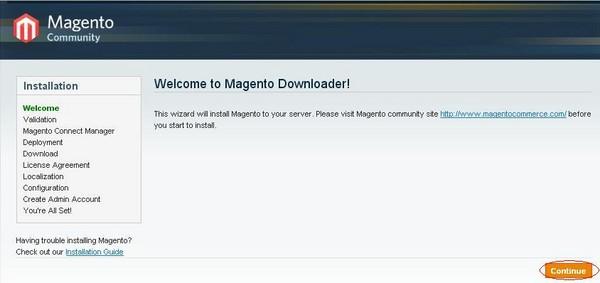
- Click on Continue button and you will get Validation for Magento Downloader screen as shown below:
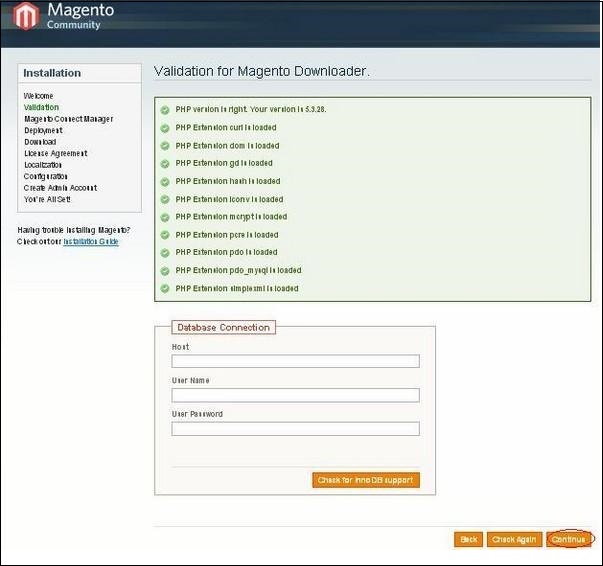 Here, enter the database details, if you want to check for InnoDB support for Magento. Otherwise, click on Continue button to proceed to next step.
Here, enter the database details, if you want to check for InnoDB support for Magento. Otherwise, click on Continue button to proceed to next step.
- Next, you will get Magento Connect Manager Deployment screen.
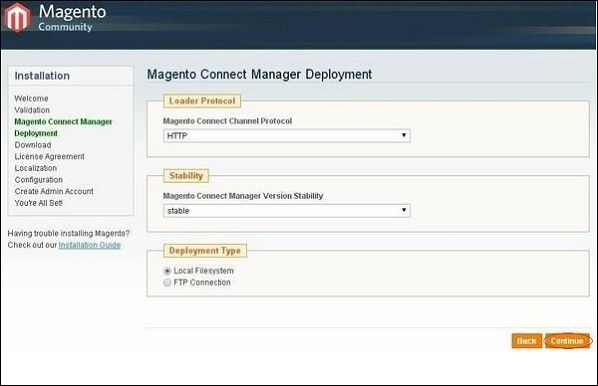 It gives protocol name (HTTP or FTP), stability version such as stable, beta, alpha and deployment type. Select proper options and click on the Continue button and it will start the downloading process for Magento.
It gives protocol name (HTTP or FTP), stability version such as stable, beta, alpha and deployment type. Select proper options and click on the Continue button and it will start the downloading process for Magento.
- Next screen will be Magento's Installation Wizard.
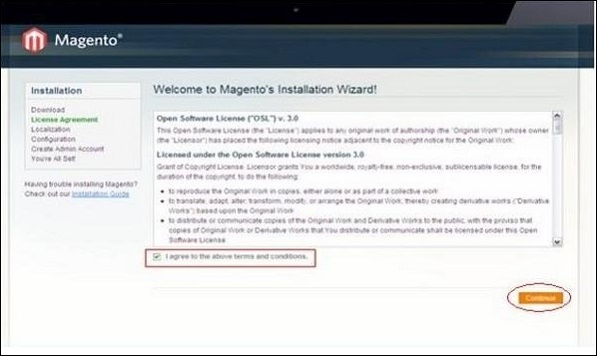 Tick the I agree to the above terms and conditions checkbox and click on the Continue button.
Tick the I agree to the above terms and conditions checkbox and click on the Continue button.
- Next you will get Localization screen for selecting the Locale, Time Zone and Currency as shown below.
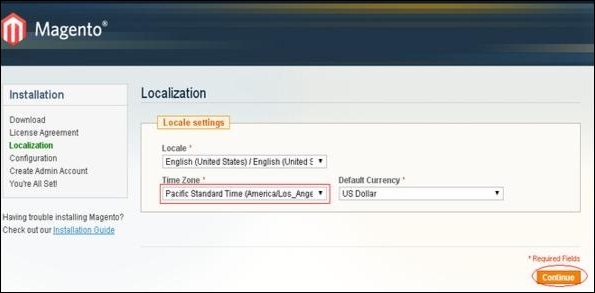 Select proper locale name, time zone and currency and click on the Continue button.
Select proper locale name, time zone and currency and click on the Continue button.
- The next is Configuration screen.
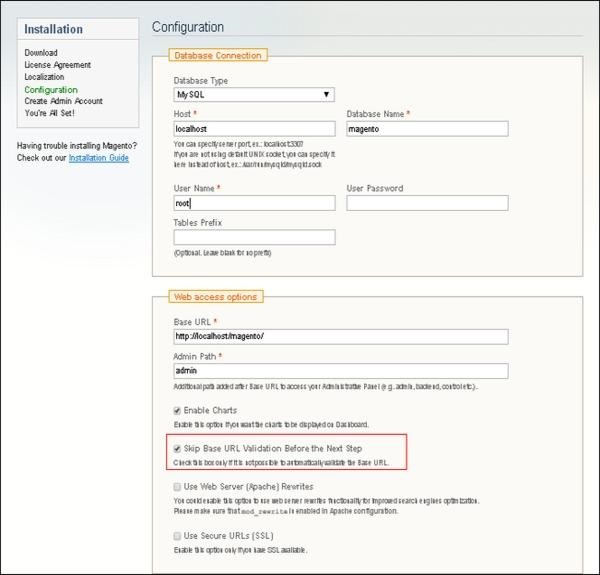 Fill the database information such as Database Type, Host, Database Name, User Name and User Password. If you do not want to validate the Base URL, then tick the Skip Base URL validation before Next Step checkbox and click on the Continue button.
Fill the database information such as Database Type, Host, Database Name, User Name and User Password. If you do not want to validate the Base URL, then tick the Skip Base URL validation before Next Step checkbox and click on the Continue button.
In case the http://localhost/magento doesn't work, use this as base url instead- http://127.0.0.1/magento
This step will take some time as Magento will be creating the Database Tables.
- Next will be the Create Admin Account screen.
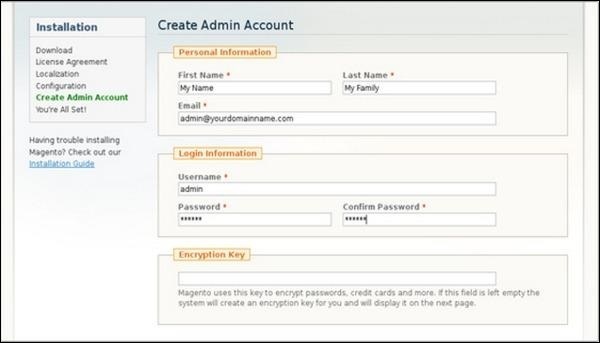 Here enter your Personal Information such as First Name, Last Name and Email and the Login Information such as Username, Password and Confirm Password to admin use in backend. Need not worry about Encryption Key field as Magento will generate a key on the next page. After filling all information, click on the Continue button.
Here enter your Personal Information such as First Name, Last Name and Email and the Login Information such as Username, Password and Confirm Password to admin use in backend. Need not worry about Encryption Key field as Magento will generate a key on the next page. After filling all information, click on the Continue button.
- Copy the encryption key, which will be used to encrypt passwords,
credit cards and other confidential information. Then you can select
Frontend or Backend of new Magento website.
- After successful installation of Magento, click on the Go to Backend button to login to admin panel.
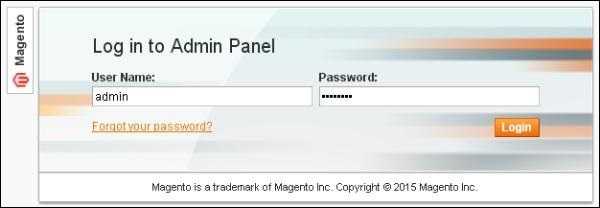
- After logging in, you will get the Dashboard of Admin panel as shown in the below screen.
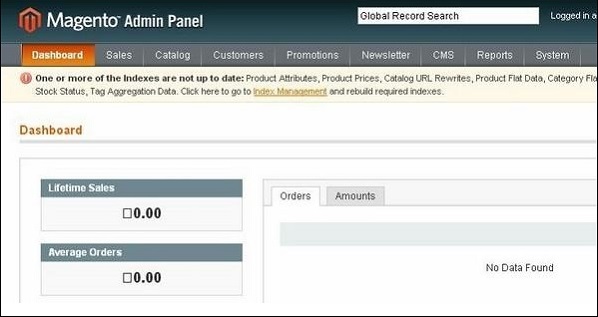


 Here, enter the database details, if you want to check for InnoDB support for Magento. Otherwise, click on Continue button to proceed to next step.
Here, enter the database details, if you want to check for InnoDB support for Magento. Otherwise, click on Continue button to proceed to next step. It gives protocol name (HTTP or FTP), stability version such as stable, beta, alpha and deployment type. Select proper options and click on the Continue button and it will start the downloading process for Magento.
It gives protocol name (HTTP or FTP), stability version such as stable, beta, alpha and deployment type. Select proper options and click on the Continue button and it will start the downloading process for Magento. Tick the I agree to the above terms and conditions checkbox and click on the Continue button.
Tick the I agree to the above terms and conditions checkbox and click on the Continue button. Select proper locale name, time zone and currency and click on the Continue button.
Select proper locale name, time zone and currency and click on the Continue button. Fill the database information such as Database Type, Host, Database Name, User Name and User Password. If you do not want to validate the Base URL, then tick the Skip Base URL validation before Next Step checkbox and click on the Continue button.
Fill the database information such as Database Type, Host, Database Name, User Name and User Password. If you do not want to validate the Base URL, then tick the Skip Base URL validation before Next Step checkbox and click on the Continue button. Here enter your Personal Information such as First Name, Last Name and Email and the Login Information such as Username, Password and Confirm Password to admin use in backend. Need not worry about Encryption Key field as Magento will generate a key on the next page. After filling all information, click on the Continue button.
Here enter your Personal Information such as First Name, Last Name and Email and the Login Information such as Username, Password and Confirm Password to admin use in backend. Need not worry about Encryption Key field as Magento will generate a key on the next page. After filling all information, click on the Continue button.


No comments:
Post a Comment